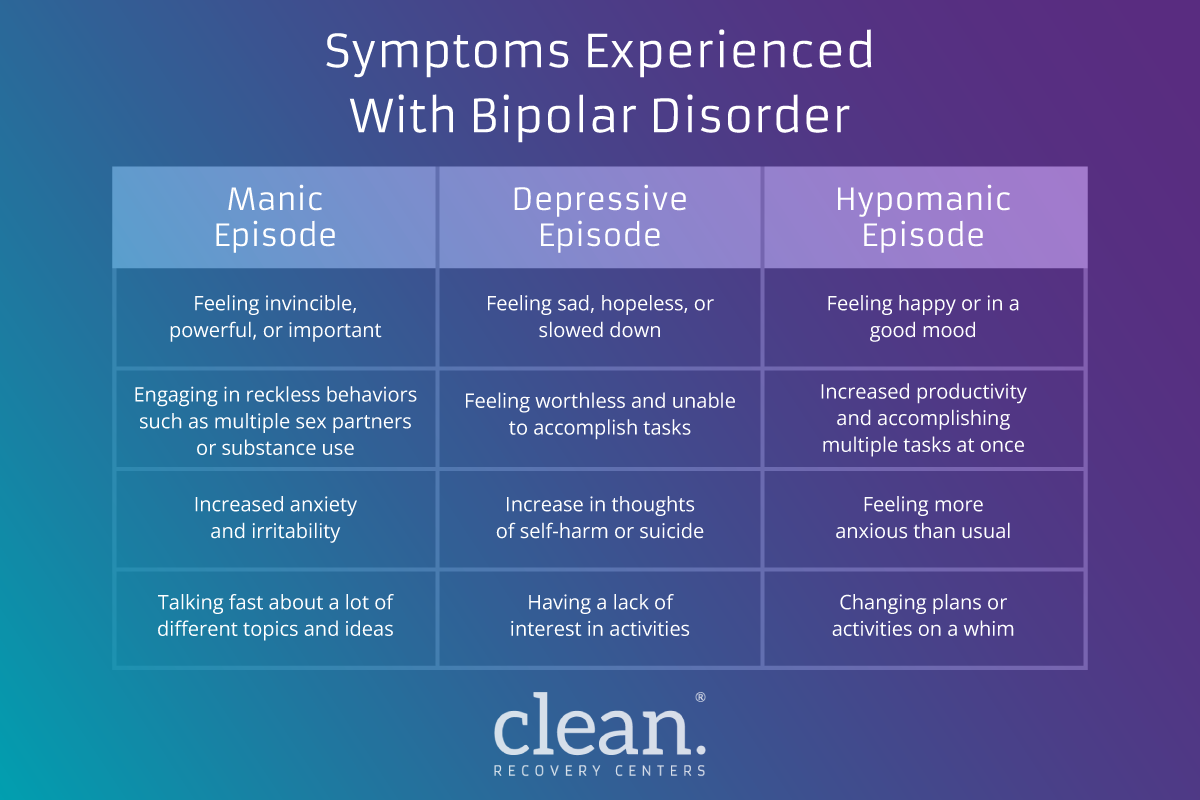Get Clean! Call us today!
Bipolar Disorder Treatment
And like a tree, we grow from the ground up.
Leaves will fall, and branches will break, but
even in those moments, it still provides
beauty to this world.
So do not give up on all that you are and
all that you could be for where you are and
what you feel at this moment.
Our strength and beauty still exists
even when we cannot see it.
-Hannah Blum
Living with a mental health condition can make us feel damaged, as if we are not meant to be a part of the “normal” world. Bipolar disorder is one of those that seem to take over our brains before we even know what is happening, leaving us wondering what to do next.
In any given year, approximately 2.6 million adults over the age of 18 are affected by bipolar disorder here in the U.S. At Clean Recovery Centers, we understand how mental health plays a large role in our livelihood. We offer a program specifically for bipolar disorder as well as co-occurring substance use disorders, so you can find the healing you deserve.

What We Treat: The Different Types of Bipolar Disorder
Bipolar disorder can affect anyone and is a lifelong mental health condition. It can cause drastic shifts in mood that can result in reckless behaviors, including substance use. Here at Clean Recovery Centers, we specialize in the treatment of bipolar disorder, substance use disorder, and co-occurring disorders. Our team is knowledgeable about the different types of bipolar disorder and provides a safe and welcoming environment for all who come through our doors.
How We Treat: Clean Recovery Centers’ Approach to Bipolar Disorder
At Clean Recovery Centers, we offer a unique, three-phase approach to addiction and mental health treatment. Those who are looking for bipolar disorder treatment will join us in phase II, called action. The first part of treatment begins with a residential II stay. Here, you will stay onsite with us and start the process of trauma resolution, cognitive self-management, identity reconstruction, and personal growth development. You will meet with a psychiatrist who will help determine a bipolar disorder diagnosis and recommend options, including medication if needed. Daily therapies and skill-building classes will round out your schedule during treatment. When residential II is complete, or when your care team deems it suitable, you will move to our partial hospitalization program (PHP) to continue with your treatment plan.
After phase II, you will transition to phase III known as maintenance. Here, you will enter our intensive outpatient program (IOP) or outpatient program depending on your care team’s recommendation. You will continue to receive therapies and attend support groups while working to transition back to your everyday life. You will have the skills and tools needed to manage your bipolar disorder while having the support of Clean Recovery Centers behind you.
For those who are taking substances, you may enter our program in phase I, known as preparation. This includes a 24/7 supervised medical detox and a residential I stay. This lets you heal your body so your mind is open and ready to begin treatment.

Understanding Bipolar Disorder: What Is It?
Bipolar disorder is a mental health condition classified as a mood disorder. It causes mood swings and has variable episodes described as manic, depressive, and mixed. Manic episodes are considered the “highs” of bipolar disorder and are characterized by elevated mood, productivity, and alertness. Depressive episodes are the “lows,” characterized by feeling sad, hopeless, and unproductive. These episodes cycle, causing periods of highs and lows that affect mood to the point they interfere with daily life.
There are two main types of bipolar disorder – type I and II. A third form of bipolar disorder, known as cyclothymia, is defined as experiencing hypomanic and depressive episodes that are not intense enough to qualify as bipolar disorder. Let’s look at the other types of bipolar disorder.
Bipolar I Defined
Those with bipolar I disorder have intense mood shifts between manic and depressive episodes. Manic episodes last for at least 7 days and sometimes symptoms are so intense the person needs to be hospitalized for safety. Between manic episodes, both depressive and mixed episodes can occur and can last up to two weeks.
Bipolar II Defined
Bipolar II experiences similar episodes as bipolar I. However, depressive episodes are more frequent while manic episodes are less severe. Instead of describing these episodes as mania, hypomania is the proper term. The episodes can vary in length, but typically depressive episodes last longer than episodes of hypomania.
Symptoms Experienced With Bipolar Disorder
Symptoms of bipolar disorder vary depending on what type of episode the person is in. Here are common symptoms associated with each type of episode:
Manic Episode
- Feeling invincible, powerful, or important
- Engaging in reckless behaviors such as multiple sex partners or substance use
- Increased anxiety and irritability
- Talking fast about a lot of different topics and ideas
Depressive Episode
- Feeling sad, hopeless, or slowed down
- Feeling worthless and unable to accomplish tasks
- Increase in thoughts of self-harm or suicide
- Having a lack of interest in activities
Hypomanic Episode
- Feeling happy or in a good mood
- Increased productivity and accomplishing multiple tasks at once
- Feeling more anxious than usual
- Changing plans or activities on a whim
What People Are Saying
 Clean Recovery Centers - Sarasota
Clean Recovery Centers - Sarasota
 Clean Recovery Centers - New Port Richey
Clean Recovery Centers - New Port Richey
 Clean Recovery Centers - Largo
Clean Recovery Centers - Largo
During mixed episodes, any of the above symptoms can occur in a combination. The person may feel depressive symptoms while also feeling reckless or irritable from mania. There is no specific combination of symptoms, and depressive or manic feelings can be more prominent than others during mixed episodes.
Who Can Develop a Bipolar Disorder?
Bipolar disorder can develop for anyone at any age, but it is common to receive the diagnosis in the late teen years to early 20s. The causes behind bipolar disorder are not clear yet, though there is some connection to physical changes in the brain in those with the condition. Bipolar disorder is also more common in those who have a parent or sibling who has been diagnosed with the condition. Despite this, there is no clear connection between genetics or brain structure and developing bipolar disorder.
There are some factors that can aggravate bipolar disorder symptoms. For example, experiencing high stress frequently can trigger depressive episodes. Taking substances and drinking alcohol can also cause episode cycling and worsen feelings of depression. This is why we treat both substance use and bipolar disorder at the same time at Clean Recovery Centers – we often see both conditions go hand-in-hand.
How Bipolar Disorder Is Diagnosed
The diagnosis of bipolar disorder comes from a medical professional such as a doctor or psychiatrist. They will perform psychological evaluations as well as a physical exam to ensure there are no other underlying conditions related to the symptoms you are experiencing.
A diagnosis may not come from the first visit alone, it may take multiple visits and documenting of symptoms. Mental health is a crucial part of your well-being, and medical professionals will take extensive notes to make sure they get the right diagnosis. They may suggest therapy or medications during this process to help manage the symptoms you are experiencing.

What to Expect During the Diagnostic Exam
During the exam, you will receive a physical exam and possibly have bloodwork completed. The doctor will ask for your current medications and any medical history you have available. They will want to know the extent of your symptoms – what you are experiencing, how long they have been going on, and how frequently they happen.
Most doctor’s offices now administer mental health surveys at the beginning of the appointment, so your doctor will already have a general idea of how you are feeling. They will need to know the specifics in order to make a diagnosis. It can feel terrifying to open up, but your doctor isn’t here to judge you. If you are uncomfortable talking in person with your doctor, ask if you can write your symptoms down. At Clean Recovery Centers, we pride ourselves in having a compassionate care team that will show you empathy and respect during the diagnostic exam.
Treatment Options for Bipolar Disorder at Clean Recovery Centers
The ups and downs of bipolar disorder can have you feeling all over the place – getting so much done in a day and then not being able to function for weeks. Seeking mental health treatment can begin the process of healing and learning how to manage your bipolar disorder. At Clean Recovery Centers, we are here to provide you with the tools and skills needed to feel like yourself again. It does not matter if you are taking substances to try to feel better, our program addresses both conditions at the same time.
If you or someone you love is living with bipolar disorder and not sure where to turn, you are in the right place. Clean Recovery Centers has multiple locations across the Suncoast, offering reachability to the care that you need. Our program incorporates wellness components including nutritional counseling, brain mapping, and more. Call us today at (888) 330-2532 to learn more about our program offerings.
Get clean. Live clean. Stay clean.
FAQs About Bipolar Disorder Treatment
Can bipolar disorder be treated without medication?
It is not necessary to take medication to treat bipolar disorder. Some may find it helpful while others benefit from therapies and coping skill development.
Is there a cure for bipolar disorder?
Though the condition can be managed, bipolar disorder does not have a cure.
